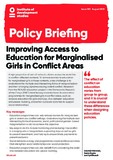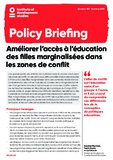Improving Access to Education for Marginalised Girls in Conflict Areas
Améliorer l’accès à l’éducation des filles marginalisées dans les zones de conflit
| dc.contributor.author | Marchais, Gauthier | |
| dc.contributor.author | Gupta, Sweta | |
| dc.contributor.author | Brandt, Cyril Owen | |
| dc.coverage.spatial | Democratic Republic of the Congo | en |
| dc.date.accessioned | 2021-08-16T09:18:12Z | |
| dc.date.available | 2021-08-16T09:18:12Z | |
| dc.date.issued | 2021-08-16 | |
| dc.identifier.citation | Marchais, G.; Gupta, S. and Brandt, C. (2021) 'Improving Access to Education for Marginalised Girls in Conflict Areas', IDS Policy Briefing 183, Brighton: Institute of Development Studies, DOI: 10.19088/IDS.2021.053 | en |
| dc.identifier.citation | ||
| dc.identifier.citation | Marchais, G.; Gupta, S. et Brandt, C. (2021) 'Améliorer l’accès à l’éducation des filles marginalisées dans les zones de conflit', IDS Policy Briefing 183, trans. by C. Havard-Bourdais, Brighton: Institute of Development Studies, DOI: 10.19088/IDS.2021.060 | fr |
| dc.identifier.issn | 1479-974X | |
| dc.identifier.uri | https://opendocs.ids.ac.uk/opendocs/handle/20.500.12413/16796 | |
| dc.description.abstract | A high proportion of out-of-school children across the world live in conflict-affected contexts. To remove barriers to education for marginalised girls in those contexts, a key challenge is to understand the multiple and intersecting forms of marginalisation and their changing dynamics during violent conflict. Research from the REALISE education project in the Democratic Republic of the Congo (DRC) identifies key considerations for education programmes for marginalised girls in conflict areas, such as inclusive education for girls and boys, links between education and peace-building, and extra-curricular activities to support social relationships. | en |
| dc.description.abstract | Une grande partie des enfants non scolarisés dans le monde vivent dans des zones de conflit. Un des principaux défis dans l’élimination des obstacles à l’instruction des filles marginalisées dans ces contextes réside dans la compréhension des formes multiples et croisées de la marginalisation et des changements dans leurs dynamiques au cours des conflits violents. Les recherches menées en République démocratique du Congo (RDC) dans le cadre du projet d’éducation REALISE identifient des éléments clés à prendre en compte dans les programmes d’éducation destinés aux filles marginalisées dans les zones de conflit, tels que l’éducation inclusive pour les filles et les garçons, les liens entre l’éducation et la consolidation de la paix, et les activités périscolaires favorisant les liens sociaux. | fr |
| dc.description.sponsorship | Foreign, Commonwealth & Development Office | en |
| dc.language.iso | en | en |
| dc.publisher | Institute of Development Studies | en |
| dc.relation.ispartofseries | IDS Policy Briefing;183 | |
| dc.rights | This is an Open Access briefing distributed under the terms of the Creative Commons Attribution 4.0 International licence (CC BY), which permits unrestricted use, distribution, and reproduction in any medium, provided the original authors and source are credited and any modifications or adaptations are indicated. | en |
| dc.rights.uri | http://creativecommons.org/licenses/by/4.0/ | en |
| dc.subject | Children and Youth | en |
| dc.subject | Education | en |
| dc.subject | Gender | en |
| dc.subject | Security and Conflict | en |
| dc.title | Improving Access to Education for Marginalised Girls in Conflict Areas | en |
| dc.title | Améliorer l’accès à l’éducation des filles marginalisées dans les zones de conflit | fr |
| dc.type | IDS Policy Briefing | en |
| dc.rights.holder | Institute of Development Studies | en |
| dc.identifier.team | Governance | en |
| dc.identifier.doi | 10.19088/IDS.2021.053 | |
| dc.identifier.doi | 10.19088/IDS.2021.060 | fr |
| rioxxterms.funder | Default funder | en |
| rioxxterms.identifier.project | Default project | en |
| rioxxterms.version | VoR | en |
| rioxxterms.versionofrecord | 10.19088/IDS.2021.053 | en |
| rioxxterms.funder.project | 9ce4e4dc-26e9-4d78-96e9-15e4dcac0642 | en |
Files in this item
This item appears in the following Collection(s)
-
IDS Research [1671]
Except where otherwise noted, this item's license is described as This is an Open Access briefing distributed under the terms of the Creative Commons Attribution 4.0 International licence (CC BY), which permits unrestricted use, distribution, and reproduction in any medium, provided the original authors and source are credited and any modifications or adaptations are indicated.



